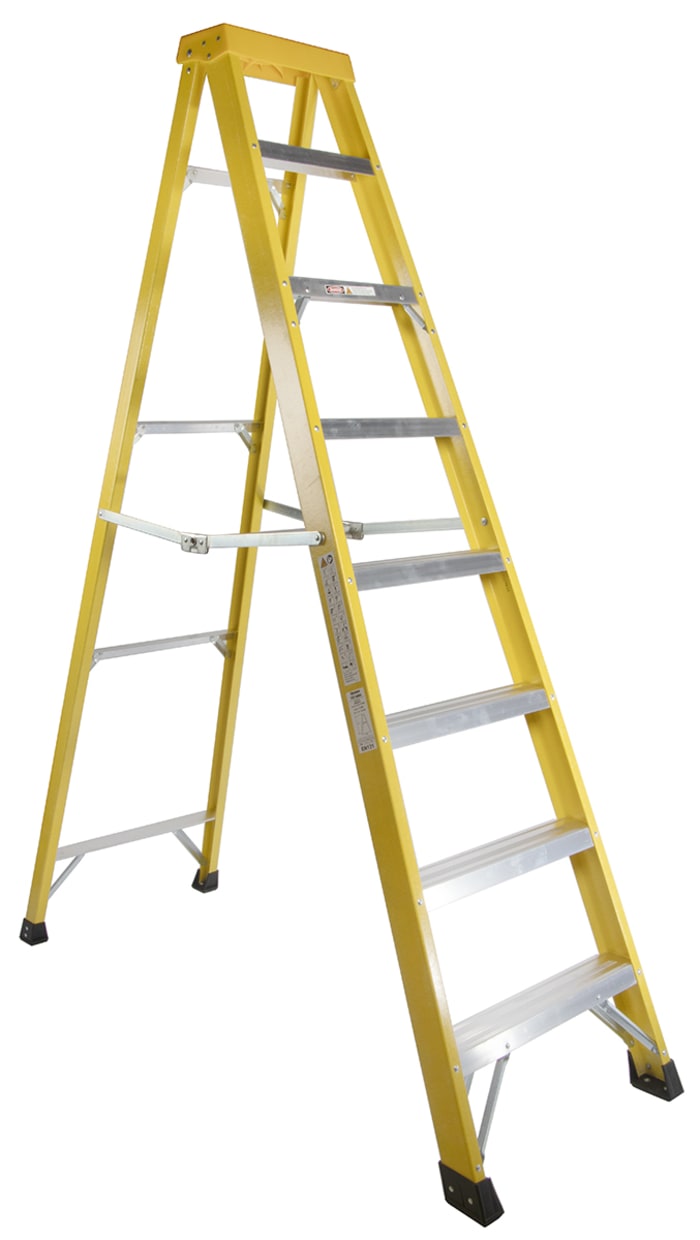Documentos Técnicos
Especificaciones
Brand
RS ProNúmero de Peldaños
7
Material del Montante
Fibreglass
Tread Material
Aluminium
Altura de la Plataforma
1.9m
Carga Máxima
150kg
Peso
9.5kg
País de Origen
China
Datos del producto
Escaleras de fibra de vidrio
La escalera de fibra de vidrio RS Pro no conduce electricidad y cuenta con peldaños reforzados resistentes que la convierten en una solución muy duradera. Se trata de una escalera plegable con peldaños antideslizantes en un lado con remaches dobles para mejorar la seguridad.
La escalera RS Pro cumple con la norma EN131 y admite una capacidad de carga estática de 150 kg.
El peldaño superior tiene un práctico soporte para herramientas para guardar las herramientas más usadas y no tener que bajar de la escalera.
Características y ventajas
La escalera de ideal para electricistas
Plástico reforzado con fibra de vidrio no conductor
Práctica bandeja con capacidad para diversas herramientas
Unión firme y resistente en ambos lados
Peldaños de aluminio con remachado doble
Patas de plástico antideslizantes
Aplicaciones típicas
Pintura y decoración
Taladrado
Reparación de luces
Acceso a altillos
Preguntas frecuentes
¿Por qué debería adquirir una escalera de fibra de vidrio?
La principal ventaja de una escalera de fibra de vidrio con respecto a una metálica es su resistencia a la electricidad y el fuego. Es un producto muy preciado entre los electricistas que trabajan cerca de fuentes de alta tensión, ya que es capaz de soportar de 25 a 30.000 voltios. Las escaleras de fibra de vidrio son muy resistentes a la intemperie, no se debilitan por la acción de la luz solar, no se corroen y no se oxidan.
¿Qué es la norma EN131?
La EN131 es una certificación de la Unión Europea para escaleras portátiles.
La norma contempla requisitos adicionales sobre estabilidad, deslizamiento, durabilidad y resistencia en posición.
¿Es seguro permanecer de pie en la plataforma de una escalera?
Si la escalera dispone de barandilla por encima de la plataforma, es seguro ponerse de pie en ella. Las normativas sobre salud y seguridad aconsejan no subirse a los tres últimos peldaños, mientras que la norma EN131 desaconsejan el uso de los dos últimos peldaños si no dispone de plataforma.
Price on asking
1
Price on asking
1
Información de stock no disponible temporalmente.
Vuelva a verificar más tarde.
Documentos Técnicos
Especificaciones
Brand
RS ProNúmero de Peldaños
7
Material del Montante
Fibreglass
Tread Material
Aluminium
Altura de la Plataforma
1.9m
Carga Máxima
150kg
Peso
9.5kg
País de Origen
China
Datos del producto
Escaleras de fibra de vidrio
La escalera de fibra de vidrio RS Pro no conduce electricidad y cuenta con peldaños reforzados resistentes que la convierten en una solución muy duradera. Se trata de una escalera plegable con peldaños antideslizantes en un lado con remaches dobles para mejorar la seguridad.
La escalera RS Pro cumple con la norma EN131 y admite una capacidad de carga estática de 150 kg.
El peldaño superior tiene un práctico soporte para herramientas para guardar las herramientas más usadas y no tener que bajar de la escalera.
Características y ventajas
La escalera de ideal para electricistas
Plástico reforzado con fibra de vidrio no conductor
Práctica bandeja con capacidad para diversas herramientas
Unión firme y resistente en ambos lados
Peldaños de aluminio con remachado doble
Patas de plástico antideslizantes
Aplicaciones típicas
Pintura y decoración
Taladrado
Reparación de luces
Acceso a altillos
Preguntas frecuentes
¿Por qué debería adquirir una escalera de fibra de vidrio?
La principal ventaja de una escalera de fibra de vidrio con respecto a una metálica es su resistencia a la electricidad y el fuego. Es un producto muy preciado entre los electricistas que trabajan cerca de fuentes de alta tensión, ya que es capaz de soportar de 25 a 30.000 voltios. Las escaleras de fibra de vidrio son muy resistentes a la intemperie, no se debilitan por la acción de la luz solar, no se corroen y no se oxidan.
¿Qué es la norma EN131?
La EN131 es una certificación de la Unión Europea para escaleras portátiles.
La norma contempla requisitos adicionales sobre estabilidad, deslizamiento, durabilidad y resistencia en posición.
¿Es seguro permanecer de pie en la plataforma de una escalera?
Si la escalera dispone de barandilla por encima de la plataforma, es seguro ponerse de pie en ella. Las normativas sobre salud y seguridad aconsejan no subirse a los tres últimos peldaños, mientras que la norma EN131 desaconsejan el uso de los dos últimos peldaños si no dispone de plataforma.

